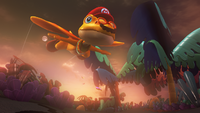Glydon
- “This spot looks pretty good for a blood-pumping power-dive! Skree-EEEE!”
- —Glydon, Super Mario Odyssey
Glydon is a creature similar to a flying lizard[1] who is enthusiastic about flying and gliding. Mario meets Glydon in several Kingdoms throughout the game Super Mario Odyssey. He states that he's travelling to various Kingdoms to glide from the highest places,[2] while the world atlas as well as his bandana having similar motifs as the ones found on the ponchos of Tostarenans indicate that his homeland is in the Sand Kingdom,[3] which is indeed the first Kingdom where he can be found in the game.[4]
Mario can take control of Glydon to glide and dive. His dive is much faster and harder to steer than his glide. While gliding, shaking the Joy-Con or Pro Controller makes the captured Glydon stay airborne longer. However, when captured, Glydon cannot swim and simply disappears as soon as he touches water.[2] On the other hand, Glydon cannot sink in quicksand; instead, he starts stomping whenever he stands on it whether he is being captured by Mario or not. A Power Moon in the Seaside Kingdom, Lighthouse Leaper, specifically requires the player to glide with Glydon from the top of the Lighthouse toward the Glass Palace and then talk to a Bubblainian near said palace.[2]
His name is a portmanteau of "glide" and "-odon", a typical suffix used for animals (often reptiles, such as Iguanodon and Pteranodon) distinguished or recognized through their teeth (despite Glydon lacking any visible teeth).
While Glydon has been stated to be a character by the official Super Mario UK Twitter account,[5] both the official Prima Games guide of Super Mario Odyssey and the official Super Mario Italian Twitter account indicate that Glydon is a species.[6][7]
Gallery
Artwork
Postcard obtained as reward in Super Mario Odyssey
Screenshots
- Glydon.JPG
Glydon in the Sand Kingdom
Glydon captured by Mario diving in the Wooded Kingdom
- SMO Glydon screenshot.png
Glydon in the Seaside Kingdom
Glydon with Mario in the Lost Kingdom
Glydon in the Darker Side.
Names in other languages
| Language | Name | Meaning |
|---|---|---|
| Japanese | カックー[8] Kakkū |
From 「滑空」, kakkū, which means "gliding". |
| Chinese | 滑翔小子 Huáxiáng xiǎozi |
Glide Boy |
| Dutch | Glydon[11] |
- |
| German | Segelmander[12] |
Portmanteau of segeln (to glide) and Salamander. |
| Italian | Planosauro[13] |
From planata (glide) and -sauro (lizard). |
| Korean | 날돈 Naldon |
From 날개 (wing) or 날다 (to fly) and -don |
| Russian | Птеродон[14] Pterodon |
From Птер-, the Russian transcription of the Greek πτερ- (wing), and -одон, the Russian transcription of the Greek -όδων (tooth). |
| Spanish | Planeosaurio[9] |
From planeo (glide) and -saurio (lizard). |
References
- ^ Nintendō Kōshiki Gaidobukku Sūpā Mario Odessei (Nintendo Official Guidebook Super Mario Odyssey,「任天堂公式ガイドブック スーパーマリオ オデッセイ」), page 20. Shogakukan. Retrieved December 19, 2017.
- ^ a b c Nintendo Life (September 20, 2017). New Character Glydon in Super Mario Odyssey for Switch. YouTube. Retrieved October 5, 2017.
- ^ Current World atlas of Super Mario Odyssey.
- ^ GamesMundo GAMER WordGames GAMER (October 26, 2017). Super Mario Odyssey Gameplay completo Part 2 Sand Kingdom 100%. YouTube. Retrieved October 27, 2017.
- ^ Post about Glydon from the official Super Mario UK Twitter account.
- ^ Super Mario Odyssey eGuide
- ^ Post about Glydon's increased reach when shaking the Joy-Cons. The text says If you shake the Joy-Cons while sailing the skies as a Glydon, you will be able to fly a little farther!.
- ^ Post about Glydon from the official Japanese Twitter account of Super Mario Odyssey.
- ^ Post about Glydon from the official Spanish Twitter account of Super Mario.
- ^ Post about Glydon from the official French Twitter account of Super Mario.
- ^ Post about Glydon from the official Dutch Twitter account of Super Mario.
- ^ Post about Glydon from the official German Twitter account of Super Mario.
- ^ Post about Glydon from the official Italian Twitter account of Super Mario.
- ^ Post about Glydon from the official Russian Twitter account of Super Mario.






